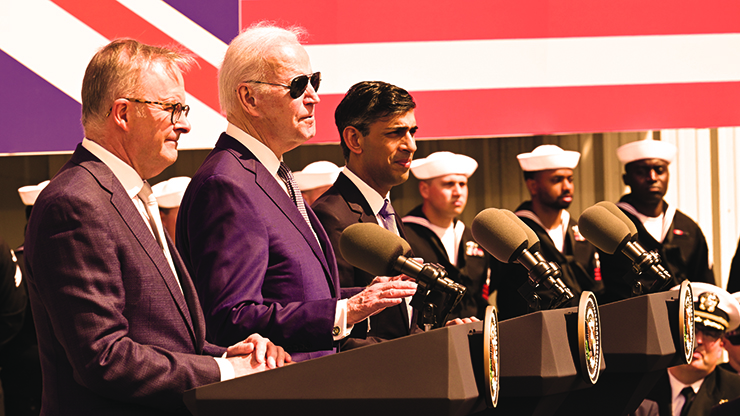
London: Artificial intelligence and autonomy companies from Australia, the United Kingdom and the United States are already feverishly developing and pitching tools to gather ever-more data and then help operators make sense of an information-overload environment. They’re hoping all this work will lead to contracts at home and with the allies soon, as more details about the second phase of the AUKUS trilateral arrangement, focused on advanced technology, come to light this fall.
Little has been formally revealed about the effort. The AUKUS collaboration was announced in September 2021, and in March 2023 the three nations’ top leaders gathered in California to reveal plans for the Pillar 1 that’s focused on nuclear-powered submarines — first involving UK and US vessels operating from an Australian base, then Australia buying American submarines as an interim solution, and then the nations collaborating on an AUKUS-specific attack submarine for the UK and Australia to each build and operate.
Pillar 2 will cover critical technologies: artificial intelligence, quantum computing, hypersonics, autonomy and more, it is believed. US Undersecretary of Defence for Research and Engineering Heidi Shyu told reporters last month she expected President Joe Biden to announce more details this fall.
“We view ourselves — even though we’re a British company, we’re an allies-first company, as we call it. So we see the AUKUS opportunity really being the ability for us to deploy what we see as a critical, strategically fundamental capability not only to the UK but to our allies,” Adarga CEO Rob Bassett Cross said during the company’s demonstration of its Vantage AI-based decision-making tool at the DSEI 2023 defence expo in London.
Michael Partridge, the general manager of Australian drone-builder SYPAQ, said his government was already in the midst of evolving its approach to helping small businesses not only develop new technologies but get them into the hands of warfighters for experimentation and on contract with acquisition officials, as part of its recent Defence Strategic Review.
AUKUS is expected to bring some legislative and policy changes that make sharing technology innovations and selling systems between the three countries much easier. Though that’s yet to happen, some companies are already gravitating towards partnerships with other AUKUS nations’ industrial bases. AUKUS promises a tighter operational tie between the three nations, and specifically their navies, as they operate in the Pacific to keep the peace and to deter Chinese aggression.















